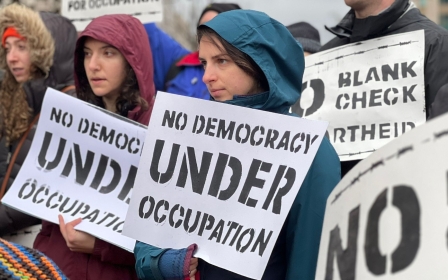Israel: Netanyahu moves a step closer with ‘judicial coup’ bill in parliament

Israel’s parliament on Tuesday moved a step closer to passing a bill that would allow politicians to overturn High Court judgements with a simple majority, as well as appoint judges.
Prime Minister Benjamin Netanyahu's planned legislation to overhaul the country’s judiciary has been described as a “judicial coup”.
In an overnight session that stretched into the early morning, the Knesset also approved several other pieces of legislation, including legislation that would prevent the country’s attorney general from declaring Netanyahu unfit for office.
The prime minister would only be declared unfit for office due to physical or mental inability and then only by the prime minister himself or by the vote of three-quarters of cabinet members.
The parliament also passed a piece of legislation that would expand settlements in the West Bank.
New MEE newsletter: Jerusalem Dispatch
Sign up to get the latest insights and analysis on Israel-Palestine, alongside Turkey Unpacked and other MEE newsletters
In a further potential blow to the judiciary, the Israeli parliament also voted for a bill that would require a consensus of 12 out of 15 judges to strike down legislation that was ruled unconstitutional.
The same bill would also allow parliament to override the supreme court with a simple majority while demanding a supermajority for the highest court to do the same.
As it stands only a simple majority is needed in the supreme court to strike down laws passed by the Israeli parliament.
Each of the bills requires additional votes before being enshrined into law.
The fact that these bills are making their way through parliament against a backdrop of historic protests in Israel against Netanyahu’s attempts to weaken the judiciary has not dampened the government’s agenda.
The bill overhauling the judiciary also has a retrospective clause, allowing parliament to overrule previous judgements by the court.
Whereas another bill would repeal sections of the 2005 Disengagement Law, which resulted in Israeli settlers evacuating four settlements in 2005, and which could now see these settlements being re-occupied.
Israeli political crises
Israel is in the midst of a political crisis that has pitted Netanyahu’s far-right government against the country’s civil society, academic and business elite, and former government ministers and military figures.
In an open letter on Sunday, more than 250 US business leaders and politicians warned that Israel’s judicial reforms will make it “increasingly difficult” to defend the country internationally.
“Many leaders in the business community will feel compelled to reevaluate their reliance on Israel as a strategic destination for investment, sourcing talent, building engineering centres, and maintaining intellectual property,” business leaders warned in their open letter.
Netanyahu is currently on trial for corruption, and the reforms could enable him to evade conviction or see his case dismissed.
Since being indicted in 2019, Netanyahu has railed publicly against the justice system, calling it biased against him.
Israel has been engulfed in political turmoil for over two months, as tens of thousands of people continue to take to the streets in mass protests.
Demonstrators want the government to scrap the controversial judicial overhaul plan that they say threatens checks and balances in the country.
The demonstrations have been growing, drawing in supporters from various professions, including the military, the justice system, and the high-tech sector.
In light of the proposed reforms the Israeli currency has declined and the leading US financial institute JPMorgan has warned of a growing risk of investing in the country.
Middle East Eye delivers independent and unrivalled coverage and analysis of the Middle East, North Africa and beyond. To learn more about republishing this content and the associated fees, please fill out this form. More about MEE can be found here.





